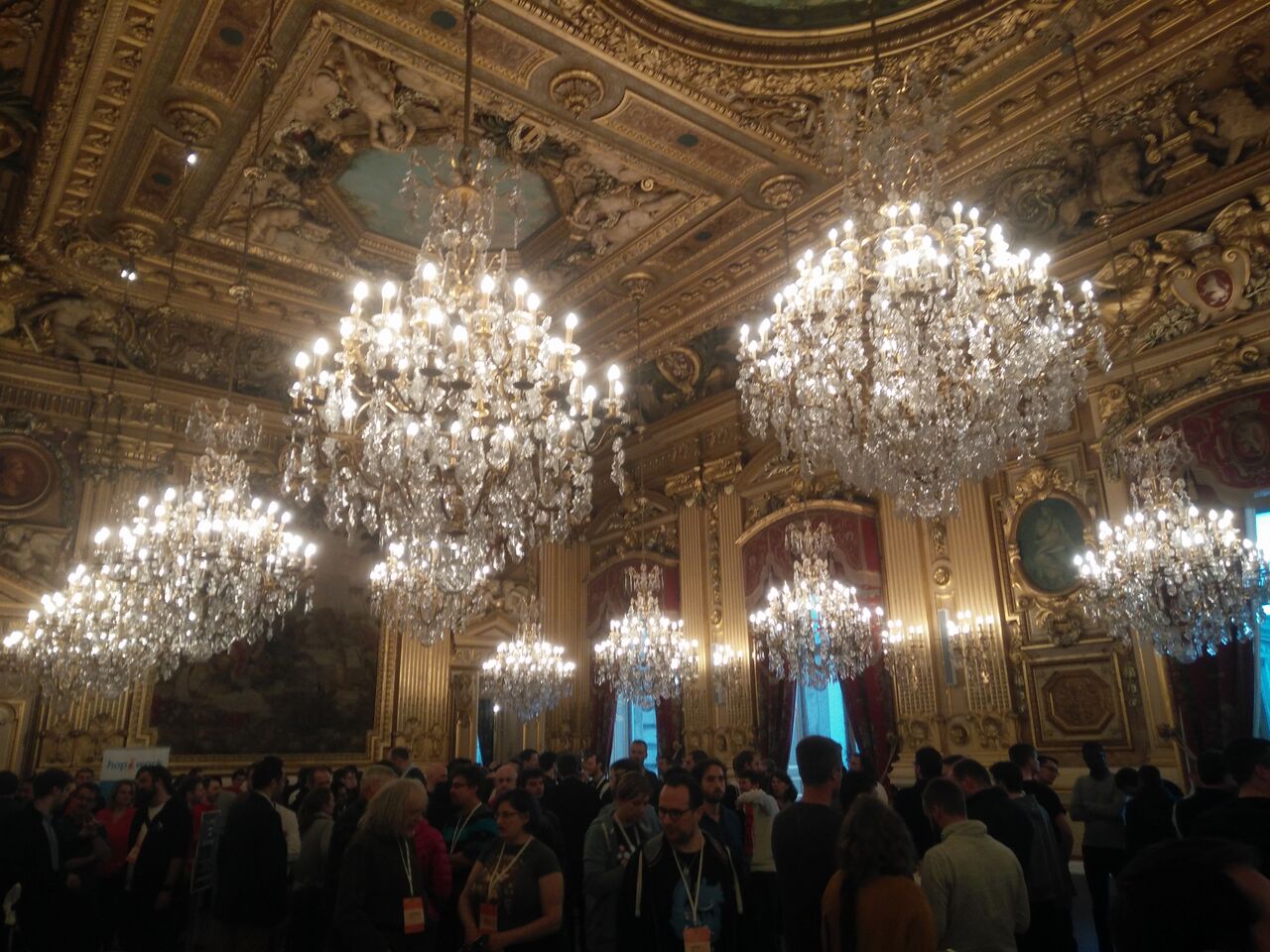MiXiT 2017: The Human Part
20 Apr 2017Last week I spent two days in Lyon, France, for the MiXiT ([mɪks ɪt]) conference. I was pleasantly surprised by the high quality, both of the event itself and of the talks. But even more by the high level of care of all the staff and attendees, the wide breadth of topics and its citizen and activism involvement.
You could feel the conference was for people, for human, for citizens, before being for developers. The tech skill level was also impressive, but the more impressive was how both aspects were so intertwined.
This blog post is about all the non-tech talks. I will write a tech-oriented wrap-up soon and link it from here.
Group dynamics
The first talk set the tone (pun intended) for the day. When I entered the main auditorium, I discovered a live classical orchestra on stage. The conductor talked about band dynamics, and its influence on the rhythm.

He never explicitly stated it, but I could not resist making parallels with other kind of groups, like dev teams, or companies.
Each member of a group can be playing its own unique tune, but when put together, the melody will be even different than the sum of all individualities. Every individuals are skilled in what they are doing, and they each know what is the global melody they want to achieve as a group. They still need to be aware of the others, to follow the same rhythm. The bigger the band, the harder it is for individuals to keep in sync with everyone.
That's when the conductor comes into play. Every individuals in the group now only need to focus on the conductor and follow his rhythm. The conductor keeps track of what everyone is doing, and helps those in need, adapting the tempo so the group acts as a whole.
A good leader can let all members of the band focus on what they each do best —playing their instrument— while reducing the amount of energy needed to focus on the tempo. A mediocre leader will not prevent a skilled band to play, it will make it harder. Each individual will do his or her best, and the result will still be enjoyable. A bad leader can stall a group to a halt, where the amount of energy needed to follow the instructions is such that people don't have enough energy left to do what they are skilled at.
An inspiring talk, all in the nuances of "show, don't tell". It got my brain started, which is always a good way to start a day of conferences!
Keynotes
Other talks, especially keynotes, were centered around issues we face, as citizens, not as developers. We had talks about local currency, universal income, ethics or alternative voting systems.
Lyon has its local currency, the Gonette (as did more than 40 other cities in France). Local currency help the flow of money to stay in a local system, not leaking to more global speculative markets.

Universal income is a concept to give all citizens of a specific country a fixed income, with no requirement. Speakers debunked the classical "so even rich people will have it?", "but people will stop working!", "it's too expensive, states don't have enough money for that" questions.
The debunking I liked the most are the polls that show that when asked about Universal Income, most of the people think that the others will stop working. But when asked if they will stop working, they say no. Everyone thinks the others are lazier than they see themselves.
Ethics
Then Guillaume Champeau made me think again with questions about ethics, as a developer.
We all know that bugs are bad and we should avoid creating them. How far one should go in making sure its code is bug free will greatly vary from one individual to another. I might do TDD from day one while others might push to prod without even testing manually. When you're developing your personal website it might be ok, but what happens when you're developing embeded code for self-driving cars or planes? A bug might kill people there. How far should you go in your testing? When can you say you've done enough?
What do you do when your company asks you to develop something illegal? Or if you're sent on a mission for a company you find unethical? Coding something you know will be used to create weapons that will kill people? What about stopping bug fixes and releases on a product you know have security holes that will leak personal data? What about feeding data you know is incomplete and/or biased to a machine-learning algorithm?
What we, as developers, might be lacking is an ethical code, some kind of oath like in other professions. Doctors, lawyers, architects or accountants have to swear an oath. They are personally responsible if they fail to follow the ethical rules of their orders. We don't have those limits. We can do whatever we want and hide behind the "it wasn't me, it's the algorithm" (thanks to the complete misunderstanding of this word by media and most judges).
Trying to do our best is not enough. Even swearing an oath is not enough. Mistakes will be made, shit will happen, data will leak. Still, thinking about what we don't want to happen is the first step in finding ways to prevent it. Technology is shaping the world of tomorrow, and we are the makers of that. We have an incredible power into our hands, and not thinking about the damage we could do is irresponsible.
I don't know which rules we should abide to, collectively, and I'm not even sure rules are the solution. But we can start, individually, to think about the limits we should never cross. Let's not wait until it's too late. Better safe than sorry.
Once again, interesting questions, and my brain racing. I've asked myself those questions in the past, and came up with my own ethical lines for most of them. But I was happy discussing with more junior developers afterwards that told me that they never thought about that before and now have to find where they stand.
After the atrocities of WW2, the Universal Declaration of Human Rights was signed. It gave every individual a set of rights that they could use to oppose states. It's 2017 today, and tech companies have more power than states. Think about Facebook and Google, that have more registered users than any state, and much more information about you than any of them.

I don't act the same when I'm alone at home or with my girlfriend. I don't talk about the same subjects in the intimacy of my home, or in the subway. I don't speak and act the same way when I'm casually discussing with a coworker around the coffee machine, or on stage in front of 250 people. I might sing under the shower in the morning, when I'm alone, but would never dare do it in the street. There are things I could talk with my friends that I would not dare say if my parents could hear it, things that are private and that I can discuss with my family but would not want to share at work, or vice-versa.
We act differently based on who is watching us, who can hear what we're saying.
Now, think about everything you told Google, and if you would have ever told the same thing to your loved one, your boss, your parents, your friends or a random person in the street?
Did you search for some illness symptoms you had? Did you search for an address for a place you wanted to go to? Did you search for a political party program? Did you search for a childhood crush?
After Snowden announced that the NSA had access to this data and used it to track terrorists, people started to change their behavior. They stopped searching for some content, afraid that they would trigger something on the NSA side and be flagged as a terrorist. When Facebook announced that it could automatically detect if you were interested in some content based on the time you spend on it, people started to consciously limit the time they spent on each article, once again, fearing to trigger anything.
Knowing who is watching you changes your behavior. People act differently now that they know that what they do online is not private, and can be accessed. People are afraid they will be judged by the content they read, and that it will backfire against them.
Let that sink for a minute. People stop searching some topics, stop reading some content, because they know they are watched. Because they know they have no privacy, they're afraid of being judged by what they read, or say, so they stope reading or saying anything that is not "the norm". They stop doing in private what they would not do in public. They stop looking for information.
Without access to information, you can only make poor choices. Choice is the cornerstone of democracy; if you have no choice, you have no democracy. Removing privacy is dangerous as it removes the ability to be informed, hence to take sensible choice. Removing privacy destroys democracy.
That's exactly why, in a democracy, voting is anonymous. If voting was public, people would vote differently.
Fighting for privacy is not because people have some dark secret they want to keep in the shadows, it's actually a fight to keep democracy alive. Privacy is a mark of trust. No society can work without trust.
Majority Judgment
The keynote about the election system was perfectly timed, a few days before the french presidential election.
It started by explaining the limitation of the current voting system where you do not vote based on who you want elected, but based on how your vote will influence the result. The goal of an election is to aggregate what voters chose, in order to pick the more consensual candidate. The majoritarian representation used in France does not correctly measure opinions as it forces voters to pick only one candidate. And we don't have opinions on only one candidate, we have opinions on each of them, but those opinions are not recorded.
When it comes to something as important as picking the person that will run the state for 5 years, being asked to summarize all our views in only one name does not seem appropriate.
What is even worse is that results can be completly different if we add or remove candidates. Of course if you add a candidate that everyone loves, he or she will be elected, and the result will be different. I'm talking about adding a candidate that will not win. Just adding one into the mix will change the outcome. Why should adding someone that won't win change the final winner?
A better system would let any number of candidate take part in the election, and the exact number should not change who is winning. A way to do that, instead of asking "who do you think is the best of this 10 candidates?", would be to ask "Between A and B, who do you think is best? And between A and C?", and ask the question for each couple of candidates. Based on that we could find the candidate that is the most preferred against the others.
This system is interesing but still has one paradox. It is possible to have results in such a way that no-one is winning. Just like the Rock-Paper-Scissor game, you can find a configuration where no clear winner exists. This is called the Condorcet Paradox.
An even better system would be to ask each voter to evaluate each candidate on a specific question. Something like "For each of the following candidate, how do you think they will best represent the French interests?" followed by a double entry table with one candidate per line and columns for Very good / Good / Average / Bad / Very Bad.
The question is important, as is the wording of the choices. It is important to note that we're not asking to give a note (like a star rating), we're asking to answer a question.
It is important because it will have an impact in the way we then calculate who is the winner. Maybe we want the one that has a majority of Very Good, or the one that has a minority of Very Bad, or something different. The suggested way, called the "majority vote", is to pick the median value for each candidate (where 50% of the votes are above, and 50% are below). The candidate with the highest median will be elected. In case of ties, we keep only the contenders and do a "trim average": we remove the best and worst results of each and recalculate the median until we have a clear winner.
I really like that the way we express our choice is not boolean and have many more nuances. Finding the right way to extract one leader from all this data is tricky. If everyone plays fair, it will pick a candidate no-one really has a strong opinion about. No-one really wanted him or her, but no-ones really rejected him or her either. Is it really what democracy is about? I'm not sure, but once again it raises an interesting question.
But the best part of this voting system for me is that we can easily see if candidates are massively rejected. The vote can show that the people does not want any of them, and a new election with new candidates can be started again.
Was really everything so awesome at MiXit?
Yes.
As you can guess from this long blog post, talks of the day were highly interesting. There were many others that I could not attend, but from the short presentation we had I know there was talks about astrophysics, diversity, design, ecology or remote working.
There was one talk that felt oddly off compared to the others, about a connected green village. The subject could have been interesting, but it was presented in such a way that it was borderline cliché: TEDTalk rhythm, "inspirational video", text-heavy slides. The message was more-or-less:
We have this awesome idea, and pre-rendered 3D images of what it will look like, with happy smiling people in it.
It will be a smart village, with smart sensors, smart water pumps and smart vegetable gardens. We'll do Big Data with it, and with AI and Machine Learning, we'll make the world a better place!
Oh, and we're hiring because we have no idea how to do anything technical.

They had everything planned on several years already, and the speaker came with her own filming crew. It felt to me like a marketing stunt to have more footage for them, not really caring about sharing anything with the audience. The name of the speaker was never ever mentioned on the slides, only the name of the guy that had the initial idea. It felt really out of place compared to the others talks.
Conclusion
Many talks made me think, made me ask questions about me, about work, about our world, our society. I have many more questions after the event than I had before, and it's a very great feeling. I hadn't felt than way since the very first editions of ParisWeb. Congrats to all the team, and I'll see you next year.

Want to add something ? Feel free to get in touch on Twitter : @pixelastic